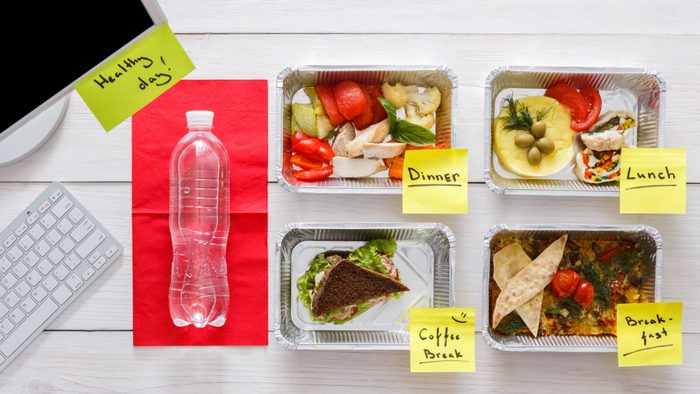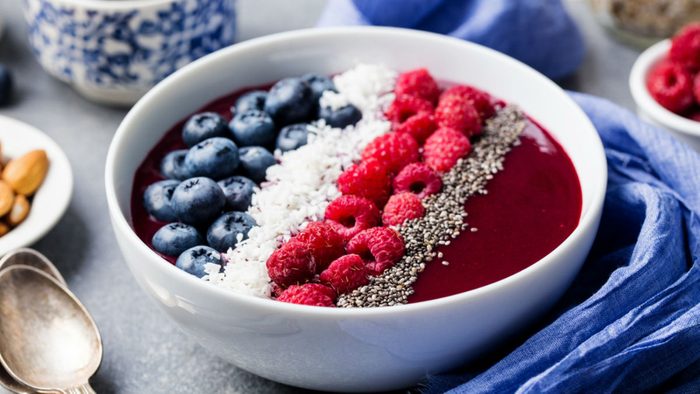
Calories are the key to weight-loss – or weight gain
Consume less calories than you burn, and the pounds will vanish like last night’s cheeseburger. Simple, right?
Actually, no. Calorie cutting works – but not as well as you might think. What’s more, not all calories are equal. Choose the right ones, and you can potentially eat less without going hungry. Choose the wrong ones, and your food could leave you wanting more.
Will I lose weight if I eat less?
Yes. Cutting calories leads to short-term weight loss, but the results won’t last forever if that’s all you do.
Weight loss is a notoriously difficult feat to pull off, and overwhelming research shows that most people who try, fail. According to a review of studies by UCLA scientists, the word on dieting is downright dismal: An average of 41 per cent of people gain back more weight than they lost within a year after starting to diet. And the researchers believe this figure is conservative – too low. It doesn’t account for people who drop out of studies because they’re embarrassed by their expanding waistlines.
That said, cutting calories does work in the short term, though it’s necessary to cut more calories than most people realize (3,500, to be exact) in order to lose one pound. According to a review of studies by the National Institutes of Health, going on a low-calorie diet (1,400 to 2,000 calories a day, depending on your current size) can help people lose eight percent of their body weight over three to 12 months.
So why do so many diets fail? There are lots of reasons. First, people are human, and diets are hard to stick with. Second, our bodies work against us: After you’ve lost some weight, your metabolism slows down so that you have to eat less and less just to maintain that weight loss. It’s your body’s way of making sure you don’t starve.
A third problem: People who are overly anxious to drop pounds sometimes cut too many calories. In the beginning, this can cause intense food cravings, although they eventually wear off. (In fact, in the long run, low-calorie diets have actually been shown to curb hunger.) Finally, if you don’t exercise while dieting, you’re likely to lose muscle mass, which slows your metabolism even more.

It matters what foods your calories come from
Yes. Calories are not created equal. Those from fat or refined carbohydrates are more likely to end up on your thighs.
If a cream-filled doughnut and a chicken breast sandwich have the same number of calories, does that mean you can have the doughnut for lunch instead of the sandwich and come out even? Nutritionally, not a chance. But even weight-wise, you’re worse off with the doughnut.
First, there’s the thermic effect of food. You may not remember this from high school biology, but it means that some foods take more energy to chew, digest, metabolize, and store than others. Unfortunately, the body is very efficient at processing fat and expends very few calories doing so ‘ one reason that fatty foods seem to spend “a moment on the lips, a lifetime on the hips.” The body is quite good at processing carbohydrates, too. Protein, on the other hand, has to be converted into carbohydrates before it can become fat. That takes a lot of work, burning up as much as 30 percent of the calories in the food you’re eating.
Then there’s the effect of food on blood sugar. Refined carbohydrates (think white bread, cookies, and fruit drinks) tend to raise blood sugar levels rather dramatically, which encourages fat storage, weight gain, and hunger. On the other hand, fibrous foods like apples, as well as protein foods, not only take more energy to digest but also raise blood sugar less, making them friendlier to your waistline.
Finally, foods that contain a lot of water, such as vegetables and soup, tend to fill the belly on fewer calories, so you’ll stop eating them way before you stop eating Timbits.

A food diary can help you lose weight by counting calories
Jotting down everything you eat keeps you honest and makes you think twice before overindulging.
Most people don’t have a clue what they really eat every day. For instance, studies show that dieters tend to underestimate their calorie intake by as much as 50 percent. Keeping a food diary can solve the problem. It doesn’t have to be fancy; any notebook will do. Just write down every morsel you put in your mouth while you’re trying to lose weight (and whenever the number on the scale begins to climb). Then use a calorie-counter book or Internet site to estimate how many calories each item contains, total up your daily calories, and tease out your diet saboteurs. Is an afternoon candy bar habit putting you over your calorie max? Are you drinking more calories than you realized with each caramel latte? Are you pouring yourself too much cereal in the morning?
Experts claim food diaries can help dieters slash 500 to 1,000 calories a day by uncovering food traps like high-sugar sodas and juices. In fact, keeping a food diary is one of four key behaviors consistently used by people in the National Weight Control Registry, an ongoing study of dieters who maintained a weight loss of 30 pounds or more for at least one year.
A good food diary is more than just a list of foods and quantities. Recording where you were, whom you were with, how hungry you were, and how you felt before and after you ate can also help you spot influential patterns. (Does work stress make you gobble up snacks at the office? Do you eat less when your husband is away?)
Don’t want to look up calorie counts for every piece of food you pop in your mouth? No problem. Seeing what you’ve eaten in black and white, even without the numbers, is likely to make you think twice before heading back to the table for a second slice of pecan pie.
Keeping a food diary is perhaps the most important strategy for weight-loss success.

Is eating less calories the the fountain of youth?
Cutting calories will not only help you fit back into your skinny jeans, it may also curb the aging process. Significantly reducing calorie intake has been shown to increase life span, at least in lab animals. As for the human research, studies show that people on calorie-restricted diets have substantially lower levels of inflammatory proteins in the blood. Why is that important? Inflammation plays a key role in virtually every human health condition, from Alzheimer’s to heart disease to arthritis. The more inflammatory substances circulating in your bloodstream, the more quickly your body will deteriorate.
How to find your calorie target
Add a zero to your weight to get your basal metabolic rate, or BMR, the amount of energy you expend at rest. Multiply your BMR by one of the numbers below, based on your physical activity level, to find the total number of calories necessary to maintain your current weight.
Sedentary = 1.2
Low activity = 1.5
Active = 1.75
Very active = 2.2
If you weigh 140 pounds, your BMR is 1,400. If you’re sedentary, multiply 1,400 by 1.2, and you find that the number of calories you need each day to maintain your weight is 1,680. Want to lose a pound a week? Slash 500 calories from that number each day for a daily intake of 1,180 calories.
Source: Your Health: What Works, What Doesn’t
Get a healthy dose of weight loss, nutrition and health news with our free newsletters.
